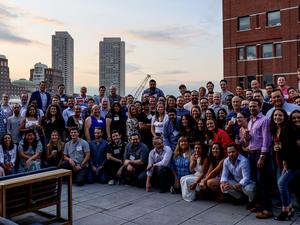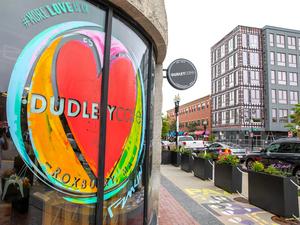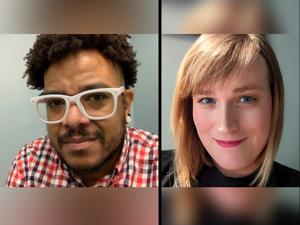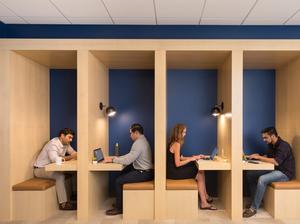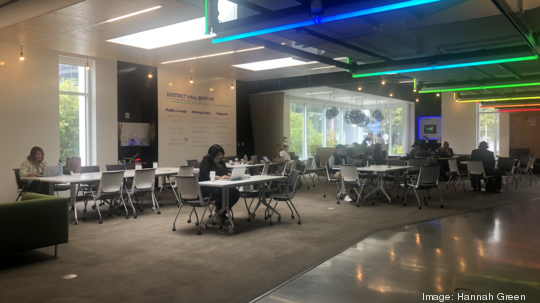
The days of barren streets and empty buildings in the Seaport during the pandemic lockdowns are long gone. On a recent weekday afternoon in District Hall, a space managed by the nonprofit Innovation Studio, people sat in groups in the café and teams gathered in several of the meeting rooms lining the hall. Outside, construction on a new Silver Line stop was underway, which will bring more accessible transport to this innovation hub.
The entrepreneurial space has bounced back from its pandemic closure and is once again supporting startups and entrepreneurs with its programs, networking events and free, public workspace.
District Hall is just one of several spaces run by Innovation Studio, including the Roxbury Innovation Center and Biz Bodega in Providence, Rhode Island. Innovation Studio also has collaborations with WPI Seaport and the Echelon Seaport condominiums to activate innovation spaces within their buildings.
BostInno sat down to speak with Innovation Studio’s Daniel Enríquez Vidaña, president, and Marisa Nieves, director of Massachusetts programs, to discuss their resources, bouncing back from the pandemic and plans for the future.
This interview has been edited for length and clarity.
For those who aren’t familiar with Innovation Studio, how would you describe your work?
Enríquez Vidaña: A lot of our work is trying to make sure that we understand people — where they’re starting — and meet them where they’re at. And take them through the variety of different programs and capabilities that we can connect them with and offer them. And then continue to connect them beyond (our programs).
Nieves: An example is one of our entrepreneurs from Mattapan is a barbershop owner. He has been working with the city, which has a great program to provide free signage to small businesses. But he was in the queue I think for three years. I sent an email out to my contacts at the Boston Local Development Corp. I was like, “Hey, I’m unsure if this is your department or not, but this is the situation.” They said it wasn’t their department, but guess what, we have a meeting with this person later. They got it flagged. I think he already has his new sign.
Why have you located yourselves outside of the ‘typical’ innovation hubs, like Kendall Square?
Enríquez Vidaña: I think the greatest challenge that still lives here in Greater Boston is the accessibility of resources for people to either want to start or grow a business idea. Not everybody has what I would call an equitable path toward it. If you take Kendall Square as an example, the access to the resources there and the connections is pretty much there and built in. You take a community like Roxbury or Mattapan or Dorchester, the resources and the spaces and the capabilities and all that stuff — I think it’s a lot harder for people to see it and understand that it’s there. And sometimes it’s not even there.
Sign up for The Beat, BostInno’s free daily innovation newsletter from BostInno reporter Hannah Green. See past examples here.
The Seaport is not known for being very diverse. How does Innovation Studio’s work aim to change that?
Enríquez Vidaña: You could argue that the Seaport needs a lot of work in terms of being more economically inclusive and opportunistic. We see that as part of our role.
Those are the conversations we’re having with the city. Those are the conversations we’re having with WS Development, who does a lot (of the neighborhood’s development).
Many of your programs are led by alumni who have started their own businesses. Why is it important to bring back people from the community?
Nieves: It speaks volumes of having a community member, a local business owner, leading the programs. There’s that rapport. They’re literally doing it. They’re from my neighborhood. They look like me. They understand what my neighborhood is like and can best deliver the information in terms that I get.
In 2019, Innovation Studio held more than 1,200 events. All that changed during the pandemic. How has the bounce back been for your organization?
Enríquez Vidaña: We’ve lost a lot of revenue over the last two years. You could call it almost a million dollars of revenue because we had not been able to open District Hall the way that we would want to run it and operate it. It’s a lot of money. What we could do with a million dollars of funds to drive more programs and expand — it’s certainly slowing us down from being able to expand as fast as we want.
Can we expect to see Innovation Studio operating in new cities anytime soon?
Enríquez Vidaña: We would want nothing more than to be in a community, say, in the Merrimack Valley, or to be in Worcester tomorrow, and say we’re going to run this program, we’re funding it, we have the capability to fund it. And instead, we have to be very cautious about it. We need to find the right partner that’s going to help us fund this so it can grow and expand.
How can people who don’t live near one of your sites access Innovation Studio resources?
Nieves: People still have access to our programming even if we’re not physically there because of the way our programs are tiered out. Our launch pre-seed program is very specific to the geographic Boston area. But our scale programs are for companies who are further along, and those are open to people nationwide.
BBJ Seven Letter poll: How does public transit affect your business? Please answer the brief questionnaire here.

